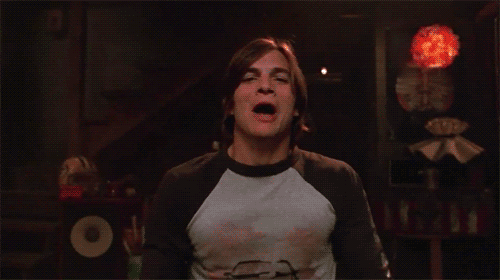A Comparison between "Hate Poem" and "Denial"
There is an interesting contrast between these two poems,
because they both boil down to a similar theme. The narrators of both
poems are both seemingly explaining the very opposite thing of what they are feeling. In "Denial", the
narrator states repeatedly that he/she is indeed
not hungover. While in "Hate Poem", the narrator repeatedly mentions how she
hates "you".
In "Denial", the narrator attempts to explain that he/she is not hungover. Now we begin the debate of what the narrator is really trying to say. Perhaps the narrator is accentuating the fact that he/she is happy that they are not hungover, and thus repeats the same four words over and over. But. The narrator doesn't use any kind of exclamatory punctuation to make it even seem like he/she is happy about this, so it seems that this poem is not likely to be about the joy of the narrator in being "not hungover".
So maybe the narrator is stating this just for the hell of it? With no emotion to it, just, "hey, guess what guys,
I'm not hungover. Just thought I'd let you know." Doesn't make much sense at all, but what are we to do?
However.
This poem is published in a collection of poems that was compiled by Former Poet Laureate of the United States, Billy Collins. If anybody would know their stuff about poems, it would be Collins. So for a poem to be selected by Collins to gain entry into this book, it would have to have some merit to it. With that being known, we must also conclude that the purpose of this poem was not just to simply state that the narrator is not hungover, as that would be too pointless.
Well then, let's look at the title. "Denial". I think that explains much of this. The narrator repeats the same phrase for 14 times - all in different ways. It's with this repetition that we can infer that the narrator is in fact in "denial", and really
is hungover. So why would they want to deny this? Perhaps he/she is an alcoholic who has been dry for a long time, and they don't want to think about the idea that they drank last night - which can easily be reasoned within themselves that it was only just a dream; but if they were to be hungover, it would confirm that they did indeed drink alcohol. Maybe the narrator is a teen who had a drunken escapade last night, and they do not want their parents to find out that they are hungover, so he/she is psyching themselves up to act as if they are definitely
not hungover.
We will never know for sure.
Either way, he/she is denying the fact that they are hungover for a reason because it obviously causes them some form of stress that we can't even comprehend.
Poor narrator...
Now, in "Hate Poem", the narrator being in denial is a similar theme. All throughout the poem, the narrator depicts the many ways in which she hates "you" ("you" most likely being a former lover of hers). After several instances of the portrayal of the narrator's hate for "you", we learn that the narrator is actually in denial as well.
"
My lungs, duplicitous twins, expand with the utter validity of my hate, which can never have enough of you," (Sheehan 24).
Even though the narrator claims that she "hates" this person, she still can't live without him - "can never have enough of [him]."
It's a sort of "hate that you love them" relationship.
We see in both of these poems that despite what is shown on the surface - that the narrator is
not hungover, or the narrator "hates" someone - the narrator's are in denial, and the opposite of what is conveyed is actually the paralleled truth.
 At my year at SFA I had many big events happen. Some I guess you could say are life-changing.
At my year at SFA I had many big events happen. Some I guess you could say are life-changing. 



